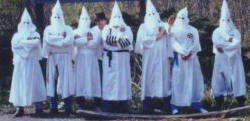
Modern Relevance:
A discussion on how SF racism is harming society
Elves, dwarves, giants, drow, halflings, and a wide variety of other races are all found in speculative fiction in today's world. Wars are fought, races are slaughtered, good guys beat the bad guys, so on and so forth, but what does this really have to do with society as we know it? Why do the existence of these various races, the coloring of their skin, their rituals and habits really matter? Why do some people seem to think that these figments of the imagination are really capable of causing any modern-day harm? The answer is very simple, is not something that many readers or authors think about when they begin their story off with a tall, pale-skinned, beautiful elf and his shorter, hideously ugly, and black orc counterpart.
To desensitize is to "to make emotionally insensitive or unresponsive, as by long exposure or repeated shocks" or simply to render insensitive or less sensitive. What does this have to do with racism in SF? A few young adults begin reading fantasy novels, such as Tolkein's Lord of the Rings, and find themselves bombarded by the graphic imagery of "slant-eyed" orcs who are black and hideous versus the beautiful and fair elves. Now, what else is new? Good guys are expected to wear white and the bad guys to wear black. If it just so happens that their skin is of the same color, then so be it. This nonchalant attitude towards the descriptions of the fantasy races is exactly what is currently causing some controversy, especially in light of the recent release of the two movies Lord of the Rings and The Two Towers, by J. R. R. Tolkein, which contain a vast amount of what some consider to be obviously racist stereotypes. For example, in the LotR movies, the orcs are black, have yellow, slanted eyes, broad noses, and some even have dreadlocks. There are obviously some remarkable similarities to the African races, though whether that is a coincidence or not is highly debated. The elves on the other hand are not only all tall and white, they are also as good and as self-sacrificing as one could wish, risking their own lives to help save the poor harassed humans. Could this possibly be Tolkein's self-idealized perception of the European nations, specifically that of Great Britain?
The common audience of fantasy is the younger audience. While it is true that there are a great number of adults that read and enjoy works of fantasy for pleasure, the target audience of such works does tend to be the teens and young adults. Now, take a developing youth and give him book after book that contains the elf vs. drow (dark-elf), dwarf vs. duergar, good white creature vs. evil black creature, and see how long it takes for that reader to come to the conclusion that white = good and black = bad. This is a quite common theme already. With such blatantly racist qualities imbedded in the literature that the youth is so rapidly absorbing, is it likely that such ideas will be completely ignored?
If the reader is white or fair-skinned, then it is generally very unlikely that they will think much of the fact that evil has been equated with darkness, especially that of the skin. However, take a young reader who is of African descent and put that youth in the same condition. Unlike the "white" youth, the "colored" reader will be much more likely to pick up on the equation of evil and dark skin. Not only that, but it would not be a stretch for this blatant equation to alienate the youth. After all, how can one read about how all races with dark skin are evil and blood-thirsty without it affecting them. This would, of course, work both ways, by causing the "black" reader to feel threatened by the fact that the authors almost unanimously equate the dark shade of one's skin to the evil in their heart. At the same time, however, it would also alienate the "white" reader through the fact that they are white and must therefore be good...meaning that they should fear or hate those who are not of their race because they are inherently evil.

This actually leads into another point: the fact that the various species in fantasy stories rarely come together in a festive manner. Instead, when two races meet, it is with contempt or indifference. This idea of racial superiority is just as dangerous as the "garden-variety" racism. The idea that one's own race is superior to others based on simple physical characteristics has lead to many hard times in the not-so-distant past: the Jews and the Aryan supremacists, the blacks and the K.K.K., and similar conflicts between races and groups. If the works of "fantasy" are transmitting these ideas, whether on purpose or through simple ignorance, it is dangerous. The racism, ethnocentricity, and supremacist attitudes that are being portrayed are rarely if ever being shown as wrong or as harmful to the societies. In fact, it is only natural for the orcs to hate the elves, or for the humans to distrust them and the dwarves, for the elves and dwarves to war, and the list of scenarios goes on. If these ideas and these philosophies are so common and so accepted in the literature, what is to stop people from taking it further? "If it works for them, maybe it will work for us." This attitude is detrimental to society and to the equality between the races. For a culture that claims to be moving beyond the color of the skin, we seem to base a lot on it.
XX************************************************************XX
| Home | Analysis | Essay | |
| Quotes & Links | References | ||